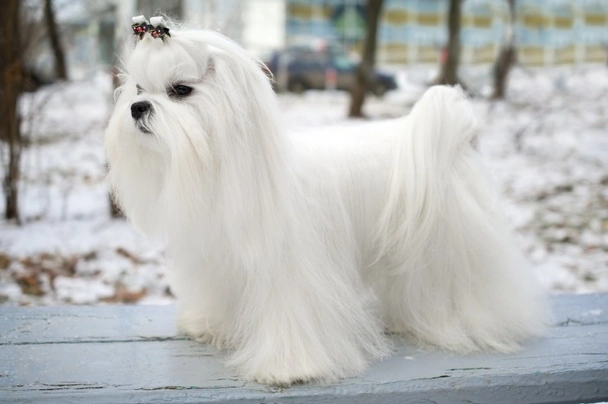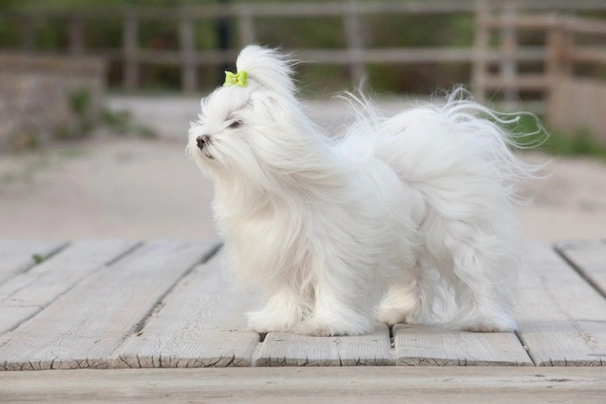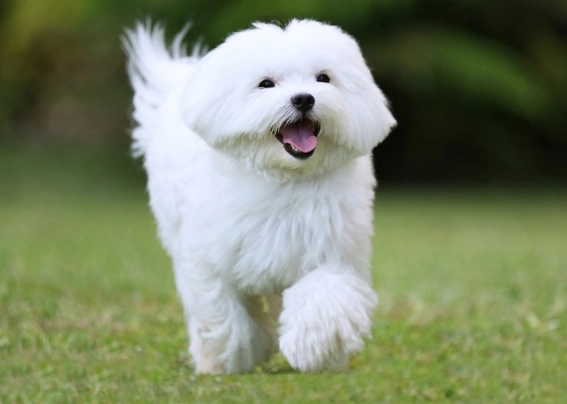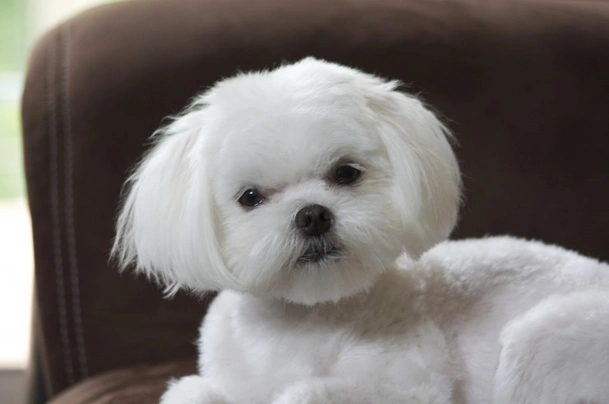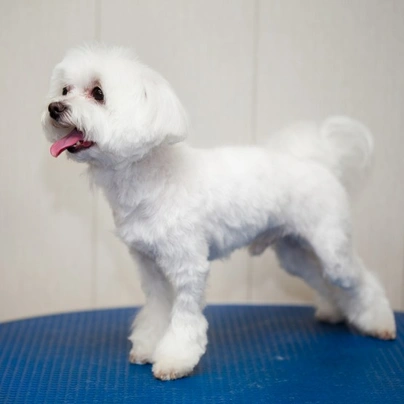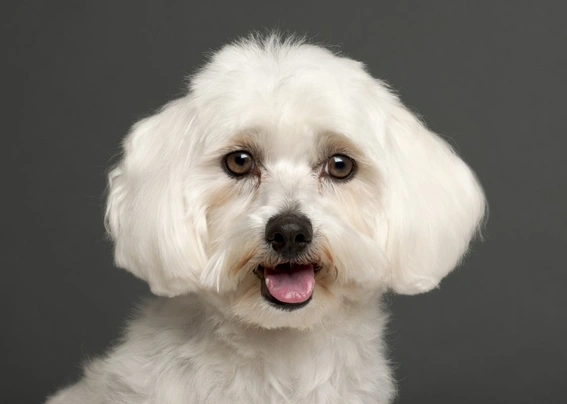Maltese
Pros
Cons
Introduction of the Maltese
These little white dogs hail from Malta where they were highly prized for their charming looks and independent natures. Over the years they have found their way into the hearts and homes of many people other than in their native Malta and for good reason. The Maltese is a charming character and one that is extremely loyal and affectionate. Despite their small stature the Maltese is a larger than life character that’s a real pleasure to share a home with.
History of the Maltese
The Maltese is thought to be among the most ancient breeds on the planet with records of them dating back 8000 years with poets and artists in pre-Christian times having made a reference to the Maltese in their works. What is thought to be a child's toy of a Maltese was found that dates back eight thousand years and Charles Darwin having estimated the breed to date back to 6000 BC.
When it comes to how the breed came to be known as the "Maltese" there is a lot of debate as to how this came about among scholars and breed enthusiasts alike. There are records of a town in Sicily known as Melita that existed in AD 25 from which many little dogs called Canes Melitei were exported. The Greeks and Romans referred to the Island of Melita as being "Malta" and they found Melitei Dogs there too. As such the ancient Greeks and Romans thought the dog originated on the Island of Malta but there is no real evidence to prove this is true. There is however some evidence that a Roman Governor in Malta named Publius owned a Maltese and that Emperor Claudius brought the first ever Maltese to the British shores.
However there are those who believe the breed is a descendant of a Spitz-type dog that was bred by people who lived in Central Europe. Because Malta boasts a central trading location the breed found their way to other parts of the world including as far afield as China and South-East Asia where they were sold to nobles and royals by traders arriving by sea in their lands.
By the mid-1800s and early 1900s breeders here in the UK thought the Maltese should belong to the Terrier group all thanks to their fearless and courageous natures. This together with the fact the Maltese was a highly skilled ratter reminded many of a terrier-type dog. However not everyone agreed and so the Maltese was simply referred to as a "Maltese Dog" from there onwards.
Between 1859 and 1873 there were twenty-four Maltese dogs registered in The Kennel Club stud book. It was a time when Lady Giffard who was a huge fan of the breed promoted these pure white dogs that boasted such silky coats and kind natures to other interested parties. Maltese dogs can be seen in many paintings and this includes of royalty with Queen Elizabeth I as well as Queen Victoria having been painted with their loyal white companions. They were painted by illustrious masters like Goya and Joshua Reynolds and it is thought Mary Queen of Scots owned one of these charming little dogs too.
The Duchess of Kent commissioned Sir Edwin Landseer to paint her little dog called "Quiz" and then commissioned the artist to paint another of her Maltese dogs called Lambkin. Over the years these lovely looking little white dogs have become a firm and popular favourite with many people not only here in the UK but elsewhere in the world too.
Interesting facts about the breed
- Is the Maltese a vulnerable breed? No they are one of the most popular dogs in the UK as well as elsewhere in the world thanks to their adorable looks and kind loyal natures
- The Maltese is among one of the most ancient breeds in the world
- Throughout time nobles and royals alike have always owned Maltese
- They often suffer from "reverse sneezing" which can be worrying although never life threatening
- The Maltese has always been a popular choice with Royals and celebrities alike
- Maltese are known to be wonderful therapy dogs
Appearance of the Maltese
Height at withers: Males 20 - 25 cm Females 20 - 22 cm
Average weight: Males 1.4 - 3.6 kg Females 1.0 – 3.0 kg
Maltese Dogs boast a superb pure white coat with some dogs having a lemon or orange tinge in them. Their hair is long and luxurious which means they are quite high maintenance in the grooming department. They don't have an undercoat so they don’t shed as much as many other breeds making them a good choice for people who suffer from allergies although it is more the dander than hair that causes the allergy problem.
Maltese dogs remain very puppy-like in their looks for most of their lives which is another reason why these dogs are so endearing and popular with people throughout the world. Their heads are rounded without being domed and they boast a well-defined stop with a broad muzzle and striking black nose. Eyes are oval shaped and dark brown in colour with black rims which adds to their sweet appeal.
The Maltese has long feathered ears that hang close to the head so the hair on them blends in with a dog's coat at the shoulder. They have strong jaws with a perfect scissor bite where their upper teeth neatly overlap their lower ones. They have short straight legs and well sloped shoulders adding to their well-balanced appearance. In a nutshell these dogs have short and compact bodies well sprung rib cages and nice level backs from their withers right to their tails. The Maltese has short well angulated back legs and their feet are round with black paw pads. Their tails are nicely feathered and dogs carry them arched over their backs.
The Maltese has a reasonably long coat but the length does not interfere with their movement. Their coats are silky to the touch and perfectly straight without being woolly or crimped looking whatsoever and they don't have an undercoat. When it comes to colour as previously mentioned these little dogs boast having pure white coats with some dogs having a little lemon or orange tinge in them which is perfectly acceptable as a breed standard.
- White
- White with Black Points
- White with Lemon Markings
Gait/movement
When a Maltese moves they do so with a straight and free-moving action and where seen from behind their legs should not be too far apart or too close together either.
Faults
The Kennel Club frowns on any exaggerations or departures from their breed standard and any fault would be judged on how badly it affects a dog's health and wellbeing as well as their ability to perform.
Male Maltese should have both testicles fully descended into their scrotums and it is worth noting that a Maltese can be a little bigger or smaller and they can be slightly lighter or heavier than stated in their breed standard which is to be used only as a guide.
Temperament of the Maltese
The Maltese is often mistakenly referred to as being a terrier which they are not and therefore they do not have a "terrier" mentality. With this said they might seem delicate and fragile with their long flowing coats and topknots but in truth the Maltese is a determined and robust little dog by nature. They are fearless and never too afraid to show their feelings and being so intelligent the Maltese quickly learns how to please their owners and families.
Maltese as previously mentioned are very alert and intelligent characters and they boast having sweet fun-loving natures. They are lively and yet affectionate and because they thrive on getting as much attention from people as possible they hate being left on their own for any length of time. Even as a Maltese gets older their energy levels remain high which means these little dogs remain lively and playful right through to their golden years. They are quite independent spirits too which is yet another reason why the Maltese has consistently been a popular choice as a family pet and companion dog here in the UK and throughout the world.
These little dogs crave human company and they really do not like to be left on their own even for shorter lengths of time. They suffer from separation anxiety which can result in dogs developing unwanted behavioural problems including howling barking chewing on furniture and scratching at doors and floors. They are the ideal choice for people who work from home or who spend a lot of time in the house but the Maltese is not a good choice for people who are rarely at home because it would make for a very unhappy dog.
Are they a good choice for first time owners?
The Maltese is a great first-time dog because they are so biddable by nature and therefore easy to train. With this said they can be a little harder to house train than other breeds of a similar size but with patience perseverance and gentleness a Maltese can be taught to do their "business" outside.
What about prey drive?
The Maltese is a social character by nature and they get on with other animals they meet which includes other pets in a household. They don’t like straying from their owners which generally means they are less likely to take off after an animal they may have spotted in the distance.
What about playfulness?
The Maltese remains very puppy-like in their behaviour well into their senior years and being so intelligent they quickly learn what pleases an owner. They are playful dogs by nature without being overly demanding although they hate being left on their own for any length of time.
What about adaptability?
The Maltese is a very versatile and adaptable little dog being just as happy living in an apartment in town as they are living in the country providing they are given enough attention mental stimulation and daily exercise.
What about excessive barking?
Unfortunately the Maltese is known to like the sound of their own voices a little too much. As such it's essential that owners gently curb their pet's desire to bark when puppies are still young but this needs to be done carefully so as not to frighten them which could end up with them barking even more. It's also important to understand that the Maltese thrives on being around people and will bark incessantly if they find themselves on their own for long periods of time. In short a Maltese would bark to get attention and to let the world know how unhappy they are at being left alone.
Do Maltese like water?
Maltese are not that fond of water and are not particularly good swimmers which could have a lot to do with the length of their coats which drag them down. Anyone who shares a home with a dog that's not keen on swimming should never force their pet into the water because it would really frighten them when they are already stressed out by things.
Are Maltese good watchdogs?
The Maltese is a very social dog by nature but they are always quick to let an owner know when there are strangers about or when something they don't like is happening in their environment. However thanks to their small size they are not the best choice for anyone who is hoping to share a home with a more impressive looking watchdog although it would be fair to say that a Maltese would always have their owner’s back regardless of their small size.
Intelligence / Trainability of the Maltese
Maltese are intelligent little dogs and they adore being around people which when all added up means they are very trainable. The problem is that because they are so cute and smart they like to test the limits and boundaries to see how much they can get away with which can lead to a dog becoming unruly and wilful therefore harder to handle and manage.
Their training needs to start early and Maltese puppies have to be well socialised from a young age for them to be truly well-rounded dogs. The key to successfully training a Maltese is to always be consistent and to set boundaries and to always handle these clever little dogs with a firm yet gentle hand. It is also worth noting that some Maltese are harder to housetrain than other breeds but as previously touched upon with understanding care and patience they can be taught not to mess in the house and to do their "business" outside.
A Maltese puppy should be taught ground rules and limits right from the word go with the first commands being as follows:
- Come
- Sit
- Stay
- Quiet
- Leave it
- Down
- Bed
Children and other
Maltese Dogs can be "snappy" around smaller children and toddlers which means any interaction between dogs and the kids must always be well supervised by an adult. As such they are better suited to households with older children who know how to behave and treat a smaller dog.
When it comes to other dogs and pets the Maltese is known to be good around them more especially if they are well socialised from a young enough age which involves introducing them to lots of new situations where they meet other dogs and animals. Any introductions to new pets and children must be done carefully so that things remain nice and calm so that nobody including a dog gets a scare. It’s best not to leave a Maltese alone with any small pets even if they have grown up together.
Health of the Maltese
The average life expectancy of a Maltese is between 12 to 15 years when properly cared for and fed an appropriate good quality well balanced diet to suit their ages.
Maltese are known to be healthy little dogs and unlike many other pure breeds they don't seem to be affected by common illnesses that plague other dogs. However any health issues reported to the Breeders Association were minor and therefore do not merit a lot of concern.
They do however seem to suffer from a condition known as "reverse sneezing" which sounds a lot worse than it is. Dogs appear to be choking but they recover quickly so there is usually no cause to worry or seek veterinary treatment when a Maltese has a bout of reverse sneezing. Another hereditary health issue that affects some Maltese is the following condition:
- Chiari malformation syringomyelia - dogs can be screened for the condition
- Acquired tremour syndrome
- Necrotising meningoencephalitis
- Myxomatous degeneration of the mitral valve
- Patent ductus srteriosus
- Pylonic stenosis
- Portosystemic shunt
- Cataracts
- Entropion
- Hydrocephalus
- Patellar luxation
- Hereditary deafness - dogs should be BAER tested through the Animal Health Trust
- Hypothyroidism
More about reverse sneezing
Breeds with shorter noses also have longer palates and when they get excited they do something called "reverse sneezing" which can be a little worrying although it is never a life-threatening condition. The causes can be various but usually it happens when debris or air is trapped under the palate causing irritation which in turn can affect a way a Maltese breathes
What about vaccinations?
Maltese puppies would have had their first vaccinations before being sold but it's essential for them to have their follow-up jabs at the right time with the vaccination schedule being as follows:
- 10 -12 weeks old bearing in mind that a puppy would not have full protection straight away but would be fully protected 2 weeks after they have had their second vaccination
There has been a lot of discussion about the need for dogs to have boosters. As such it's best to talk to a vet before making a final decision on whether a Maltese should continue to have annual vaccinations which are known as boosters.
What about spaying and neutering?
A male Maltese can safely be neutered when they are 6 months old and females can be spayed when they are 6 months old too.
What about obesity problems?
Some Maltese gain weight after they have been neutered or spayed and it's important to keep a close eye on their calorie intake and the amount of daily exercise they get to prevent obesity. An obese Maltese would be put at risk of developing certain health issues which could end up shortening their lives by several years.
What about allergies?
Maltese are prone to suffering from allergies which can be triggered by several things and when a dog develops a problem it’s best to have them examined by a vet to establish what is causing the flare up. The most common causes of a dog developing an allergy typically includes the following:
- Environment
- A reaction to certain chemicals commonly found in household cleaning products
- Seasonal allergies which includes pollen and grasses
- Food which includes certain meats and cereals often used as ingredients in commercially produced dog food
- Tick and flea bites
- Dust mites
- Mould
Participating in health schemes
Currently there are not BVA/KC health schemes available for the Maltese but all potential owners should discuss any health issues the breed is known to suffer from with breeders before purchasing a puppy from them. However all responsible breeders should have the dogs tested for the following:
What about breed specific breeding restrictions?
There are no breed specific breeding restrictions under the Kennel Club rules for the Maltese at the present time.
What about Assured Breeder requirements?
Currently there are no Kennel Club Assured Breeder requirements in place for the Maltese**.**
Caring for the Maltese
As with any other breed a Maltese needs to be groomed on a regular basis to make sure their coats and skin are kept in tip-top condition bearing in mind that these little dogs have 3 coats types during their lifetimes namely a puppy coat which they keep right up until they are around 12 months old a young adult coat and then finally their mature coats. They also need to be given regular daily exercise to ensure they remain fit and healthy. On top of this they need to be fed good quality food that meets all their nutritional needs throughout their lives.
Caring for a Maltese puppy
It's important to have things ready for when a puppy arrives in their new home. This involves puppy-proofing the house and garden so it is safe for them to be in without any risk of them injuring themselves. This means making sure a puppy cannot chew on any electric wires and to remove any toxic plants from both the home and the garden. It's also a good idea to limit the amount of space a puppy can roam around in and a good way of doing this is to invest in some child gates to fit on specific doors. Another good way of limiting how far a puppy can roam is to buy a well-made playpen for them to safely romp around in without getting under anyone’s feet.
It is never a good idea to leave a Maltese puppy alone when they are in the garden because they can injure themselves on many things and being so inquisitive by nature they are likely to get into all sorts of things and have a taste at a lot of things they shouldn't too which includes any rubbish that's been left lying around.
Puppies need a lot of rest in between bouts of boisterous play so it's essential they have a quiet area to retreat to when they want to nap. Puppies can sleep anything up to 21 hours a day which they need to preserve their energy so they can grow and develop as they should. With this said their "quiet" area should not be too out of the way because it's important to keep a close eye and ear on a puppy just in case they get into any sort of trouble and need rescuing. Puppies being so small can easily catch a chill so it's important they are kept warm when they are sleeping.
A Maltese puppy would have been wormed before being sold and the documentation a breeder provides for a puppy must have all the details of their worming date and the product used as well as the information relating to their microchip. It is essential for puppies to be wormed again keeping to a schedule which is as follows:
- Puppies should be wormed at 6 months old
- They need to be wormed again when they are 8 months old
- Puppies should be wormed when they are 10 months old
- They need to be wormed when they are 12 months old
Things you'll need for your puppy
There are items needed to care for a puppy which should be purchased well in advance of their arrival. The items needed include the following:
- Feed and water bowls making sure they are not too deep and ideally they should be ceramic rather than plastic or metal
- A good quality dog collar harness and lead
- A dog crate that's not too small or too big that a puppy would feel lost in it
- A well-made dog bed bearing in mind that a puppy could well chew on it
- Baby and/or dog blankets to use in the puppy's crate and dog bed
- Good quality toys and chews for puppy to gnaw on
- Dog specific toothpaste and tooth brush
- Shampoo and conditioner specifically formulated for use on dogs
- Grooming equipment
Keeping the noise down
All puppies are very sensitive to loud noises so it is important to keep the volume of a television down and not to play music too loudly either because it could frighten a Maltese puppy and prevent them from napping as they should during the day.
Keeping vet appointments
Reputable breeders would always ensure their puppies vaccinated before they are sold but as previously mentioned it is up to their new owners to make sure they are given their follow-up shots at the right time which should be as follows:
- 10 -12 weeks old bearing in mind that a puppy would not have full protection straight away but would only be fully protected 2 weeks after they have had their second vaccination
When it comes to boosters it's best to discuss these with a vet because there is a lot of debate about whether a dog really needs them after a certain time. However if a dog ever needed to go into kennels their vaccinations would need to be fully up to date.
What about Maltese when they reach their golden years?
When Maltese reach their golden years they slow down in many ways and they might start showing their age with more grey hairs appearing on their faces and more especially around their muzzles. Apart from a change in their appearance a Maltese personality might change too and this includes on how quick they are to respond to a command or when their names are called. The reason for this is that many older dog's hearing is not as good as it once was. Other changes to watch out for in a Maltese when they reach their senior years include the following:
- Their vision might be impaired and their eyes seem cloudy
- Their teeth might not be as in good condition which means they may need dental work
- Older dogs tend to sleep more during the day and they get up more frequently at night which is often because their cognitive function is not as sharp as it was when they were young which means older dogs are more easily confused
- They tend to be less tolerant of loud noises and sounds
- Dogs when they are older can be a little fussier about their food so it's important to rethink their diet and to make sure they are getting all the nutrients they need to stay healthy
- An older dog's immune system often does not offer them the same protection against illness and infection which puts them more at risk of catching something and why they should see the vet more routinely
- An older Maltese might not be so keen to go out for a walk and more especially longer ones
- They muscle tone and body condition is not as good as when they were young
- Older dogs often suffer from joint problems which can then lead to arthritis so it's well worth investing in a comfy dog bed and ideally one that a Maltese finds easier to get out of
Grooming of the Maltese
Maltese Dogs shed little hair which means they are easy maintenance when it comes to grooming and keeping their coats looking smart. However it does pay to take them along to be professionally groomed from time to time. They do also tend to get tear stains under their eyes which are more noticeable due to their white coats and although unsightly this does not pose any sort of health issue. Cleaning tear stains can be done using a clean damp cloth being careful not to hurt a dog's eyes in the process.
Many white coated dogs also develop urine stains which are not only unsightly but if not regularly cleaned can become smelly too. As such it's important to gently clean any areas on a dog's coat that's starting to look dirty and if a dog's rear end and legs are very stained to bath them using a dog specific shampoo and to make sure they are thoroughly rinsed off and dried afterwards.
Grooming tools needed for a Maltese
Having the right grooming tools helps keep their coat and skin in top condition. The tools needed to keep a dog's coat looking good are as follows:
- A grooming glove
- A slicker brush
- A bristle brush
- A fine toothed comb
- Nail clippers
- A pair of round ended scissors
- Dog specific shampoo and conditioner
Exercise of the Maltese
These dogs may be small in stature but they are lively energetic characters and therefore need to be given the right amount of daily exercise and mental stimulation for them to be truly happy well-balanced characters. It’s important for these little dogs to burn off any excess calories otherwise they may put on too much weight which can negatively impact their overall health and well-being.
Feeding of the Maltese
If you have decided to get a puppy from a breeder they would provide you with a feeding schedule and it's important to stick to it for the first few weeks after bringing a puppy home. You can change their diet when the time is right but this needs to be done very gradually and carefully over a few weeks to make sure puppies don't suffer any tummy upsets. Puppies do a lot of growing during the first couple of years of their lives which in short means it's crucial for them to be fed a high-quality diet when they are young.
Older dogs are not known to be fussy or finicky eaters but this does not mean you can feed them a lower quality diet. It's best to feed a mature Maltese Dog twice a day once in the morning and then again in the evening making sure it's good quality food that meets all their nutritional requirements. It's also important that dogs be given the right amount of exercise so they burn off any excess calories which is important or they might start to gain too much weight.
Feeding guide for a Maltese puppy
Once a puppy is settled into their new homes it is safe to change their diets but as previously touched upon it needs to be done gradually and carefully to avoid any tummy upsets. As a rough guide Maltese puppies can be fed the following amounts every day to ensure they are getting all the nutrients they need to grow and develop properly:
- 2 months old - 29g to 34g depending on a puppy's build
- 3 months old - 32g to 37g depending on a puppy's build
- 4 months old - 33g to 38g depending on a puppy's build
- 5 months old - 33g to 38g depending on a puppy's build
- 6 months old - 28g to 33g depending on a puppy's build
- 7 months old - 24g to 29g depending on a puppy's build
- 8 months old - 23g to 28g depending on a puppy's build
- 9 months old - 23g to 28g depending on a puppy's build
- 10 months old - 23g to 28g depending on a puppy's build
Once a Maltese puppy is 11 months old they can be fed adult food
Feeding guide for an adult Maltese
As a rough guide an adult fully grown Maltese can be fed the following amounts every day to ensure they stay fit and healthy:
- Dogs weighing 1 kg can be fed 20g to 23g depending on activity
- Dogs weighing 1.5 kg can be fed 15g to 18g depending on activity
- Dogs weighing 3 kg can be fed 54g to 62g depending on activity
- Dogs weighing 3.6 kg can be fed 59g to 67g depending on activity
Maltese price
If you are looking to buy a Maltese you would need to pay anything from £600 to over £2000 for a well-bred pedigree puppy. The cost of insuring a male 3-year-old Maltese in northern England would be £20.27 a month for basic cover but for a lifetime policy this would set you back £41.22 a month (quote as of March 2016). When insurance companies calculate pet insurance they factor in a few things and this includes where you live in the UK and a dog's age and whether a dog has been neutered or spayed.
When it comes to food costs you need to buy the best quality food whether wet or dry to feed your dog throughout their lives making sure it suits the different stages of their lives. This would set you back between £30 - £40 a month. On top of this you would need to factor in veterinary costs if you want to share your home with a Maltese and this includes their initial vaccinations their annual boosters the cost of neutering or spaying your dog when the time is right and then their annual health check visits all of which could quickly add up to over a £800 a year.
As a rough guide the average cost to keep and care for a Maltese would be between £60 to £100 a month depending on the level of insurance cover you opt to buy for your dog but this does not include the initial cost of buying a well-bred pedigree Maltese puppy.
Buying advice
When visiting and buying any puppy or dog there are many important things to consider and questions to ask of the breeder/seller. You can read our generic puppy/dog advice here which includes making sure you see the puppy with its mother and to verify that the dog has been wormed and microchipped.
The Maltese is an extremely popular breed both in the UK and elsewhere in the world which means that well-bred puppies command a lot of money. As such with the Maltese there is specific advice questions and protocols to follow when buying a puppy which are as follows:
- Beware of online scams and how to avoid them. You may see online and other adverts by scammers showing images of beautiful Maltese puppies for sale at very low prices. However the sellers ask buyers for money up front before agreeing to deliver a puppy to a new home. Potential buyers should never buy a puppy unseen and should never pay a deposit or any other money online to a seller. You should always visit the pet at the sellers home to confirm they are genuine and make a note of their address.
- As previously touched upon the Maltese is among the most popular breeds in the UK. As such there are many amateur breeders/people who breed from a Maltese far too often so they can make a quick profit without caring for the welfare of the puppies their dam or the breed in general. Under Kennel Club rules a dam can only produce 4 litters and she must be between a certain age to do so. Anyone wishing to buy a Maltese puppy should think very carefully about who they purchase their puppy from and should always ask to see the relevant paperwork pertaining to a puppy's lineage their vaccinations and their microchipping.

Only one puppy available!!!!
£800
Maltese pupies 100% pure breed 2 boys available .
£1,300
